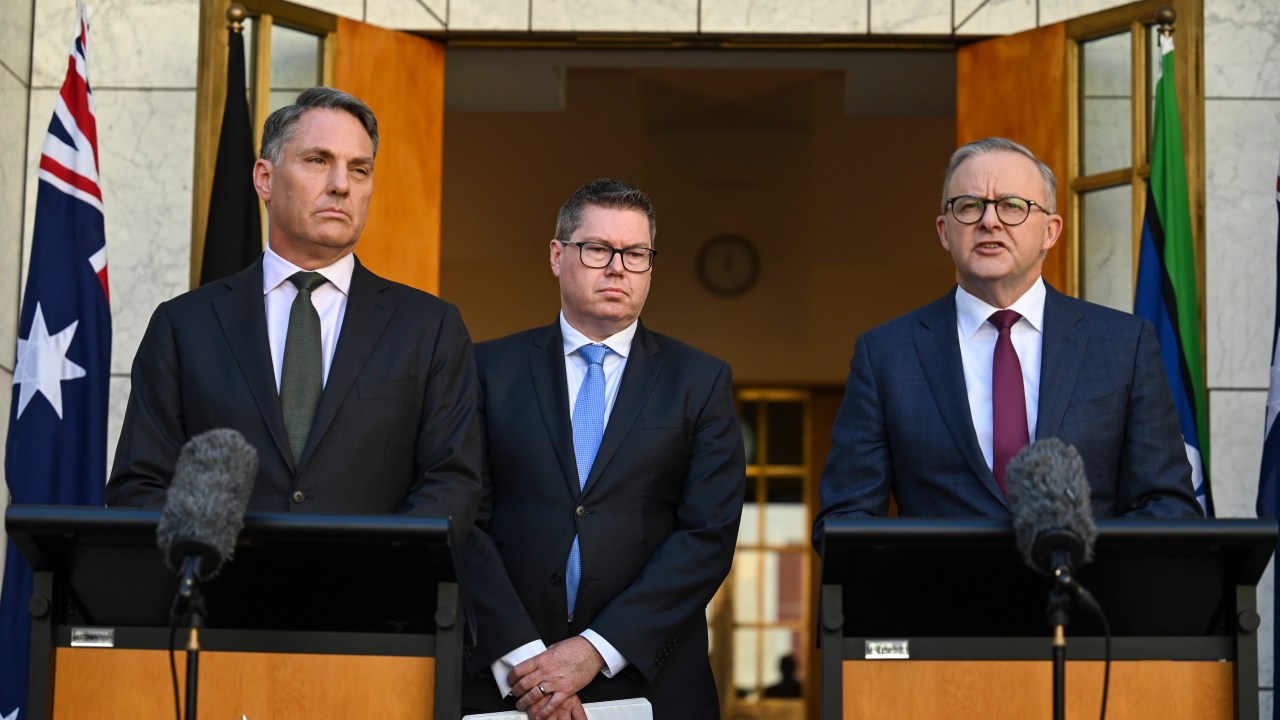Richard Marles, Australia’s Deputy Prime Minister, commands attention in the nation’s political landscape. His career trajectory within the Australian Labor Party, marked by significant policy contributions and key appointments, has positioned him as a prominent figure in Australian politics. This exploration delves into his multifaceted roles, examining his responsibilities as Deputy Prime Minister, his stances on critical issues such as defence and foreign policy, particularly concerning the AUKUS agreement, and the public perception surrounding his leadership.
We will also analyze his key policy initiatives and their impact on Australia.
From his early career progression to his current influence on national and international affairs, this comprehensive overview aims to provide a nuanced understanding of Richard Marles’ impact on Australia’s political and strategic direction. We’ll examine his successes, challenges, and the broader implications of his political journey.
Richard Marles’ Political Career
Richard Marles’ career exemplifies a steady ascent within the Australian Labor Party, marked by significant policy contributions and a gradual accumulation of influence. His trajectory highlights a commitment to specific policy areas and a demonstrable ability to navigate the complexities of Australian politics.
His political journey began with a focus on industrial relations and national security, areas that have consistently shaped his political positions and legislative efforts. This focus, coupled with a pragmatic approach, has allowed him to build a strong reputation within the party and broader political landscape.
Early Career and Rise Within the ALP
Richard Marles entered federal politics in 2007, winning the seat of Corio for the Australian Labor Party. His early years were characterized by a focus on building relationships within the party and establishing himself as a credible voice on industrial relations and national security issues. He served on various parliamentary committees, gaining valuable experience and refining his political skills.
This period saw him steadily increase his influence within the party, gradually taking on more prominent roles.
Deputy Prime Minister Richard Marles’s recent focus on economic stability is particularly relevant given the current business climate. The recent news regarding mosaic brands voluntary administration highlights the challenges facing Australian businesses, and underscores the importance of government policies aimed at supporting economic resilience. Understanding these challenges will undoubtedly inform Richard Marles’s future economic strategies.
Key Political Appointments and Positions
Marles’ career progression has been marked by a series of significant appointments reflecting his growing stature within the ALP. These appointments demonstrate the party’s trust in his abilities and his consistent performance.
Richard Marles, Australia’s Deputy Prime Minister, is known for his insightful political commentary. For a different kind of puzzle-solving challenge, you might enjoy exploring the complexities of the nyt crossword clues , which often require a similar level of sharp deduction. Returning to Marles, his recent statements on international relations have sparked considerable debate.
- 2013-2016: Shadow Minister for Defence.
- 2016-2019: Shadow Minister for Immigration and Border Protection.
- 2019-2022: Shadow Minister for Defence.
- 2022-Present: Deputy Prime Minister and Minister for Defence.
Significant Policy Contributions and Legislative Achievements
While specific legislative achievements are often collaborative efforts, Marles has been a key figure in shaping Labor’s policy positions on several crucial issues. His contributions often reflect a pragmatic approach, balancing ideological considerations with practical realities.
- National Security: He has been a prominent voice in debates surrounding Australia’s defense capabilities and strategic partnerships, advocating for increased defense spending and stronger alliances.
- Industrial Relations: His background in industrial relations has informed his approach to labor market policy, influencing debates on worker rights and fair wages.
- Immigration and Border Protection: His time as Shadow Minister for Immigration and Border Protection saw him engage with complex issues surrounding asylum seekers and border security, shaping Labor’s policy responses.
Comparison with Other Prominent Australian Politicians, Richard marles
Marles’ political stances can be compared and contrasted with those of other prominent Australian politicians, revealing both areas of alignment and divergence. This comparison provides a clearer understanding of his political positioning within the broader Australian political landscape.
For example, while sharing Labor’s commitment to social justice with figures like Anthony Albanese, his approach to national security issues might differ in nuance from some within the party. Similarly, his positions on economic policy could be compared and contrasted with those of prominent figures in the Liberal and National parties, highlighting areas of both agreement and disagreement.
Key Policy Initiatives Undertaken by Marles: Richard Marles
Richard Marles, during his time in various ministerial roles, has been involved in shaping several key policy initiatives impacting Australia’s domestic and international affairs. This section will focus on three significant examples, examining their goals, strategies, and outcomes. It is important to note that the success of any policy initiative is complex and often subject to ongoing evaluation and contextual factors.
| Initiative | Goals | Strategies | Outcomes |
|---|---|---|---|
| Strengthening the Australia-US Alliance | Deepen strategic cooperation with the United States across defense, intelligence, and economic spheres; enhance interoperability and joint capabilities; solidify Australia’s position within the Indo-Pacific region. | Increased joint military exercises, intelligence sharing agreements, collaborative defense industry projects (e.g., AUKUS), enhanced diplomatic engagement at all levels. | Increased defense cooperation and interoperability; progress on AUKUS submarine program; strengthened diplomatic ties; however, challenges remain in balancing the alliance with regional relationships and navigating domestic political sensitivities. |
| Addressing Climate Change | Reduce Australia’s greenhouse gas emissions; transition to a low-carbon economy; enhance Australia’s international climate leadership. | Investment in renewable energy technologies; implementation of carbon pricing mechanisms (though this has been a subject of significant political debate); participation in international climate agreements (e.g., Paris Agreement); promotion of sustainable practices across various sectors. | Some progress in renewable energy deployment; however, significant challenges remain in meeting emission reduction targets, balancing economic growth with environmental concerns, and achieving bipartisan support for climate action. The exact success in terms of emission reductions is subject to ongoing monitoring and data analysis. |
| Reforming Australia’s Defence Force | Modernize the Australian Defence Force (ADF); enhance its capabilities to meet evolving security challenges; improve the ADF’s readiness and operational effectiveness. | Significant investment in new defense equipment and technology; restructuring of the ADF to improve efficiency and interoperability; increased focus on cyber security and space capabilities; strengthening alliances and partnerships. | Improved ADF capabilities in some areas; ongoing efforts to modernize equipment and enhance readiness; however, challenges remain in managing budget constraints, addressing personnel shortages, and adapting to rapidly evolving technological advancements. The long-term impact of these reforms is still unfolding. |
Richard Marles’ journey, from within the Australian Labor Party to the office of Deputy Prime Minister, showcases a career defined by significant policy contributions and a strong focus on Australia’s strategic position in the Indo-Pacific. His involvement in the AUKUS agreement, coupled with his views on defence and foreign policy, highlights his pivotal role in shaping Australia’s future. Understanding his leadership style, policy initiatives, and public perception is crucial to comprehending the current state of Australian politics and its future trajectory.
This analysis provides a comprehensive overview, though further research into specific policy details and evolving political dynamics is always encouraged.
Q&A
What is Richard Marles’ educational background?
Information on his educational background would require further research beyond the provided Artikel.
What are Richard Marles’ key personal interests outside of politics?
Details regarding his personal interests are not included in the provided Artikel and would require additional research.
What is Richard Marles’ family background?
Information about his family background is not provided in the Artikel and would necessitate further research.


